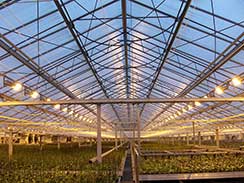By Kurt Knebusch
 More and more growers are using greenhouses and high tunnels, says the organizer of a workshop that will show how to boost the structures' crop quality, profitability and sustainability, especially by managing water better.
More and more growers are using greenhouses and high tunnels, says the organizer of a workshop that will show how to boost the structures' crop quality, profitability and sustainability, especially by managing water better.
Ohio State University's 2014 Greenhouse Management Workshop takes place Jan. 16-17 at the Ohio Agricultural Research and Development Center (OARDC), 1680 Madison Ave., Wooster. OARDC is the research arm of Ohio State's College of Food, Agricultural, and Environmental Sciences.
"Rising demand for local food has inspired many growers to improve their operations for better yield and to be more socially responsible," said Peter Ling, an associate professor in Ohio State's Department of Food, Agricultural and Biological Engineering (FABE).
"Growing food crops in greenhouses and high tunnels not only extends the growing season but also improves the quality of the crops."
The workshop is intended for progressive greenhouse growers, greenhouse equipment manufacturers and their technical support staff, and Extension educators, Ling said.
The program features sessions by Ohio State, Penn State and industry experts. It also offers tours of state-of-the-art greenhouses on OARDC's Wooster campus and at the Foertmeyer & Sons Greenhouse Co. in Delaware north of Columbus.
The workshop's goal is to help growers increase their profit margins and cut their environmental impact by raising their structures' production efficiency, Ling said.
Reducing surface-water runoff and collecting surface water, such as in ponds and cisterns, will be two of the major topics.
"We'll cover just-in-time and just-the-right-amount irrigation strategies for minimizing nutrient and water losses and subsurface leaching," he said. "We'll also have several talks in the areas of surface runoff collection, pond design and pond water quality that will address collection, treatment and recirculation for plant production usage."
Training during the workshop will enable participants to test the water quality at their own operations.
"Water management is generally considered the most important cultural practice in plant production," Ling said. "Better water management can improve profitability by reducing production costs and improving crop quality.
"It can also improve sustainability by minimizing surface-water runoff and nutrient-rich discharge into the environment."





